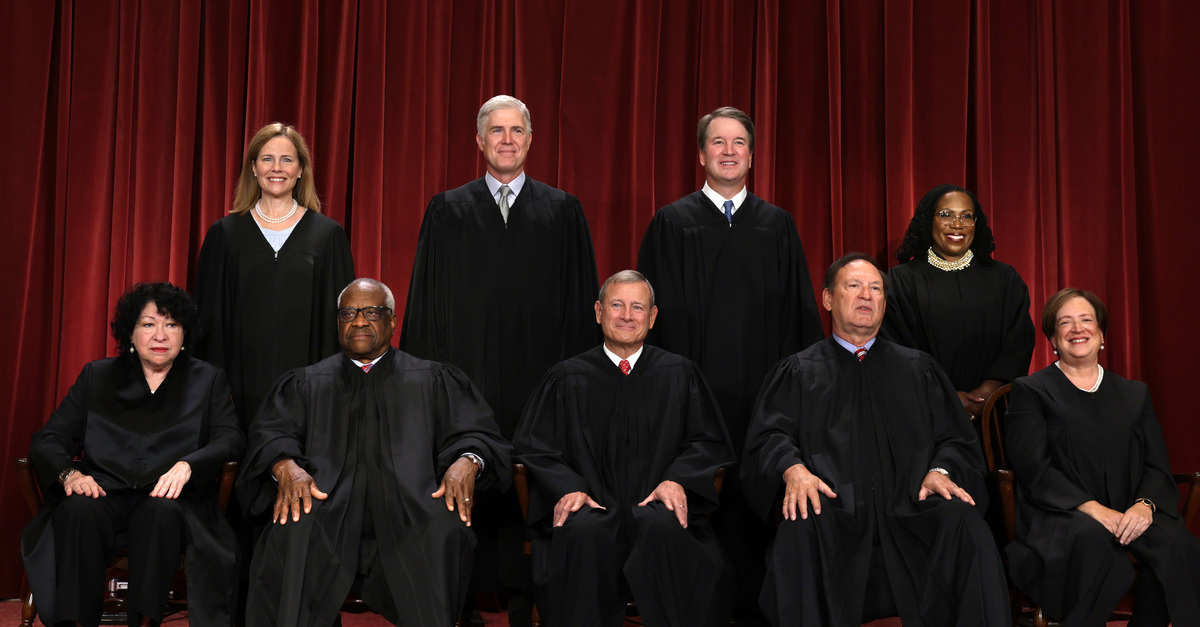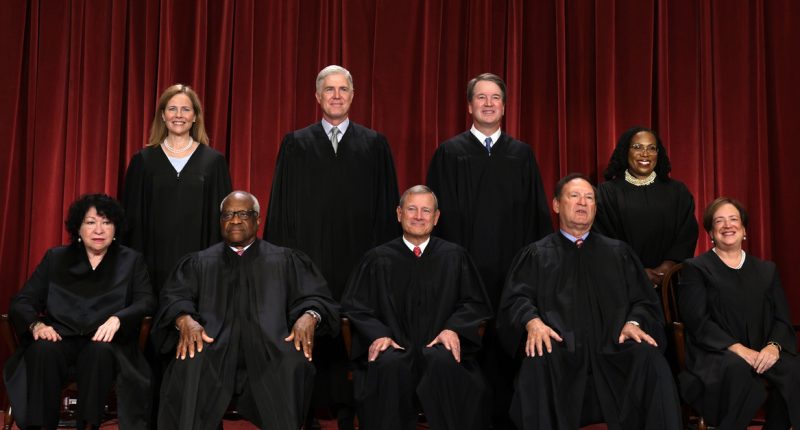
WASHINGTON, DC – OCTOBER 07: United States Supreme Court (front row L-R) Associate Justice Sonia Sotomayor, Associate Justice Clarence Thomas, Chief Justice of the United States John Roberts, Associate Justice Samuel Alito, and Associate Justice Elena Kagan, (back row L-R) Associate Justice Amy Coney Barrett, Associate Justice Neil Gorsuch, Associate Justice Brett Kavanaugh and Associate Justice Ketanji Brown Jackson pose for their official portrait at the East Conference Room of the Supreme Court building on October 7, 2022 in Washington, DC. (Alex Wong/Getty Images)
The justices of the U.S. Supreme Court have avoided resolving the “state of disarray” among the federal circuit courts on gun rights when they sent a case involving a federal felon in possession statute back to the circuit court for reconsideration.
The high court vacated remanded the appeal on Monday of Andre Dubois, whose conviction for sending firearms overseas came under scrutiny after the Supreme Court handed down a major gun ruling while his appeal was still pending.
The U.S. Court of Appeals for the Eleventh Circuit ruled against Dubois in March. Dubois had tried to ship firearms wrapped in aluminum foil and hidden inside two deep fryers from an Express Copy Print & Ship store in Georgia to the Commonwealth of Dominica in 2018. After federal officials discovered and seized the shipment, Dubois was charged and convicted under the federal “felon in possession” statute.
While Dubois’s appeal of his conviction was pending, the Supreme Court handed down the landmark gun decision in New York Rifle Assn. v. Bruen, in which the six-member majority ruled that New York’s gun licensing regulations violated the Second Amendment, because they restricted gun rights in a way that was not sufficiently grounded in “historical tradition.”
In response, Dubois raised the argument that his conviction should be vacated because under the new Bruen precedent, the federal statute under which he was convicted was unconstitutional.
The Eleventh Circuit disagreed and ruled that the even though Bruen significantly widened gun rights, the felon in possession statute is still constitutional, and Dubois’s conviction still stands. A three-judge panel of the circuit court ruled that Bruen reinforced the holding of District of Columbia v. Heller — which said that full gun rights extend only to “law-abiding, responsible citizens.”
Dubois appealed to the Supreme Court and argued that the lower courts are in a “state of disarray” over their conflicting interpretations of the felon-in-possession statute post-Bruen. On the practical side, Dubois also argued in his brief that, “Someone who attempted to evade their taxes 20 years ago and has not committed a crime since should retain their Second Amendment rights.” and that likewise, “Someone who committed felony shoplifting at 18 and is now a 40-year old mother who has never been in trouble since should retain their Second Amendment rights.”
The justices sidestepped Dubois’s request, and instead, vacated his conviction and returned the appeal to the Eleventh Circuit with instructions to reconsider in light of the Court’s June 2024 decision in United States v. Rahimi.
In Rahimi Chief Justice John Roberts wrote that some lower courts had “misunderstood the methodology of our recent Second Amendment cases,” and advocated for a somewhat narrower reading of the Bruen case.
Rahimi was an 8-1 ruling with Justice Clarence Thomas — Bruen’s author — as the lone dissenter; it upheld a federal law restricting domestic abusers from possessing firearms, and noted that recent Second Amendment jurisprudence “were not meant to suggest a law trapped in amber.”
“From the earliest days of the common law, firearm regulations have included provisions barring people from misusing weapons to harm or menace others,” the chief justice wrote, suggesting a softened version of Bruen’s “historical analogue” mandate as he provided numerous historical examples of dangerous people being denied firearms.
In Dubois’ brief to the justices, he specifically argued against a remand to the Eleventh Circuit, calling such an outcome, “an exercise in futility,” of which “the government is well aware.”
Dubois argued, “Post-Rahimi, the split among the circuits has only hardened,” with vehement disagreement among judges and circuits. Dubois urged the justice to grant certiorari to resolve the split “and restore national harmony” with respect to Second Amendment challenges to the statute.
The justices, for their part, obviously did not agree.






